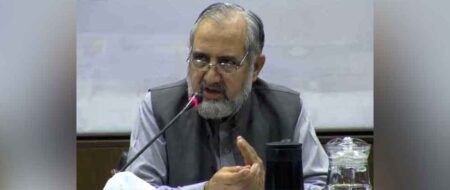‘Global Struggle for Kashmir: The Role of Think Tanks’
Kashmir needs strategic narrative, proactive diplomacy, and amplified Pakistani support: Dr Ghulam Nabi Fai
Despite the illegitimate maneuvering and exploitative Indian initiatives against the right to self-determination, the people of Kashmir stand firm in their aspirations and have not lost hope. It has become urgent and crucial for Pakistan to develop a tangible plan for strategic narrative building, effective communication, and proactive diplomacy of the issue. This has to be taken forward by uniting the voices and resources of the over two million strong Kashmiri diaspora along with their Pakistani counterparts, including think tanks, academics, diplomats, and government.
This was observed by Dr Ghulam Nabi Fai, an eminent Kashmiri leader and secretary general of the World Kashmir Awareness Forum (WKAF), during a session on ‘Global Struggle for Kashmir: The Role of Think Tanks’ held at IPS on May 22, 2024.
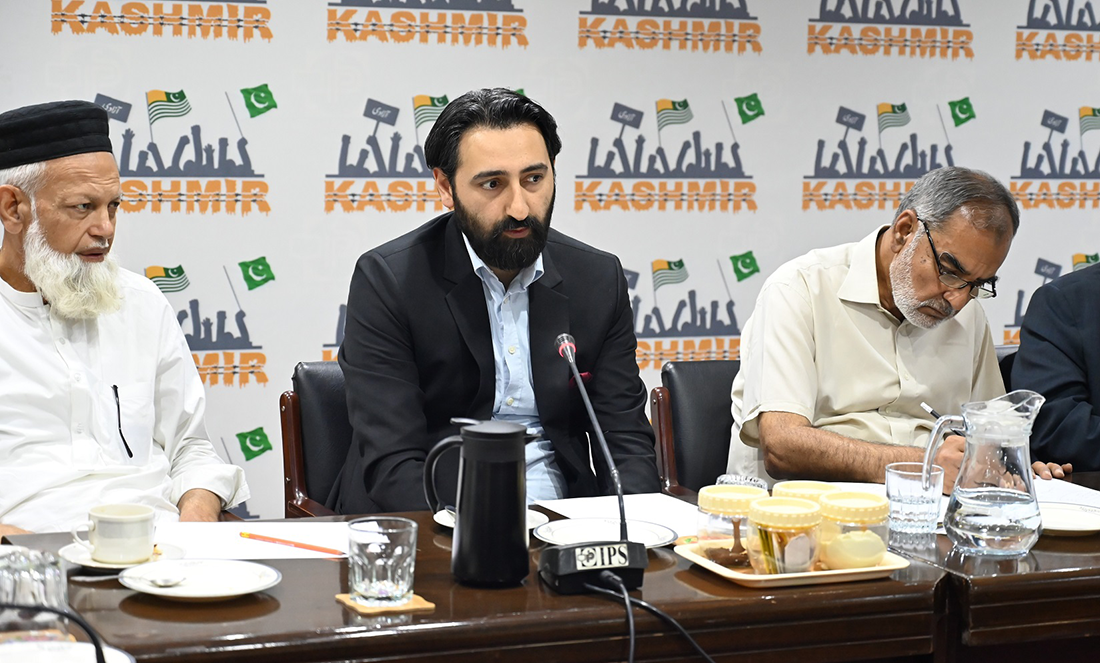
The forum was also addressed by Khalid Rahman, chairman IPS, Nazeer Ahmed Qureshi, chairman World Kashmir Freedom Movement (WKFM), Muzzammil Ayub Thakur, president WKFM, Zafar Qureshi, WKFM, Dr Sheikh Waleed Rasool, Kashmiri academician and activist, Ghulam Muhammad Safi, convener, Tehreek-e-Hurriyat Jammu and Kashmir, and Abdur Rashid Turabi, leader of Jamaat-e-Islami AJK. The session was moderated by Nadeem Farhat, research fellow IPS.
Dr Fai contended that after introducing large-scale demographic changes in Kashmir in violation of international law, the Indian government has initiated a systematic “de-Islamization of Kashmir” in its efforts to rip Kashmiris of their origins, history, and characteristics through various measures including cultural assimilation efforts, the establishment of educational institutions to propagate a narrative aligned with the Indian government’s ideology, and continued military highhandedness. Dr Fai emphasized that the repealed provisions of the Indian Constitution were not a major factor in the struggle for the self-determination of Kashmir but they have historically empowered and protected the identity of Indian Illegally Occupied Jammu and Kashmir (IIOJK).
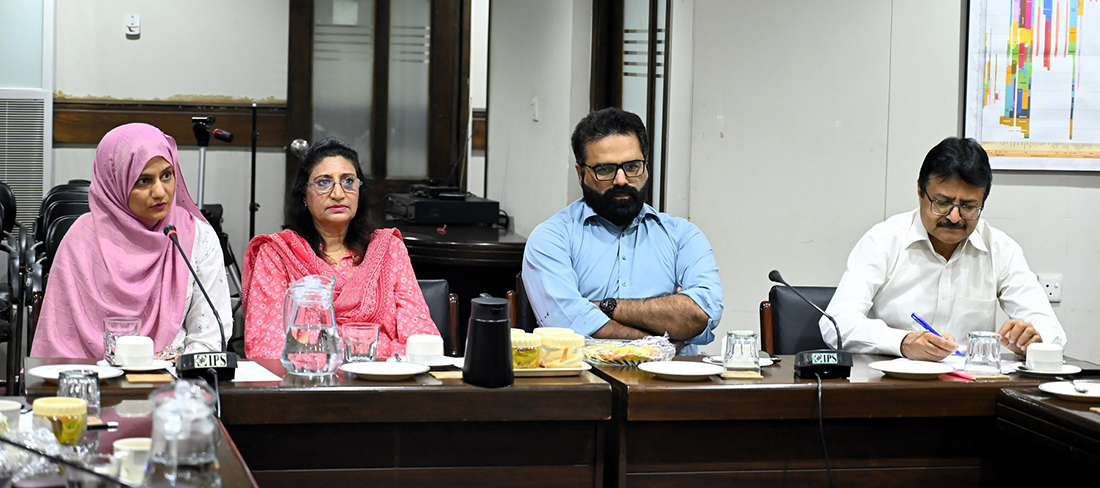
The Indian government is also attempting to foster a sense of allegiance to India within the younger generation in Kashmir, said Nazeer Qureshi. This is a threat to the preservation of the unique identity and aspirations of the Kashmiri people.
Endorsing this, Muzzammil Thakur underscored the seemingly irreversible nature of India’s revocation of Article 35A, which was more significant to Kashmiri identity than the more familiar repealed Article 370. One crucial way to fight against this, he said, is through narrative building and public policy advocacy for Kashmiri freedom. He called for engagement with the younger generation and creating a deeper understanding of India’s cultural and historical influences within Kashmir.
Adding to this, Zafar Qureshi emphasized that the ongoing grave human rights violations by India must be communicated to the world clearly and assertively. He stressed that in order to persuade India to resolve this issue according to the UN resolutions, the right to self-determination for the Kashmiri people and their freedom must be actively and assertively pursued through the internationally accepted and justified means.
The Kashmir issue must appear as an assertive, united, and strong cause. For that, strengthening connections between the people of Azad Kashmir and Pakistan is crucial, ensuring a unified voice for the cause, said Waleed Rasool.
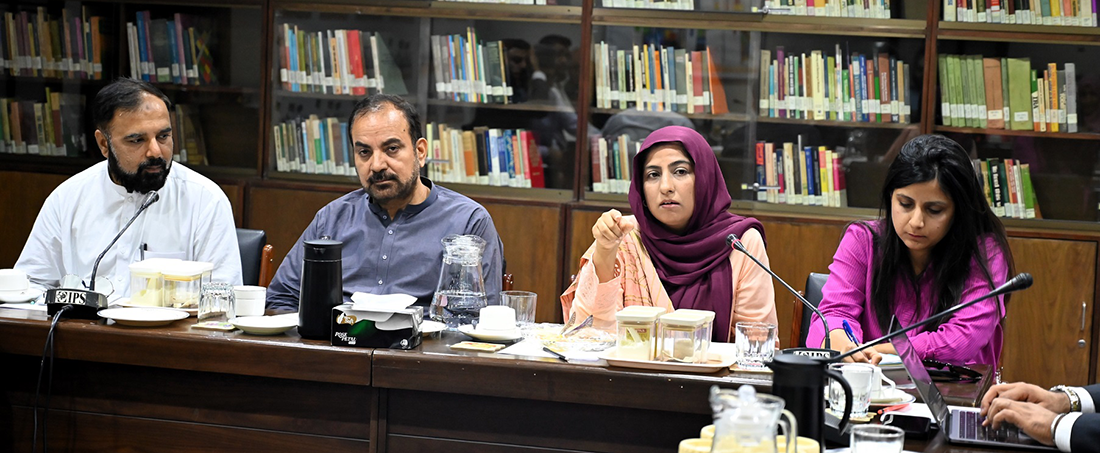
Ghulam Muhammad pointed out that India has falsely but successfully portrayed the indigenous movement of Kashmiri people for the legitimate cause of self-determination as terrorism. He advocated for concerted efforts to convey the foundations, principles, and history of the struggle to the younger generations so that they may realize the significance and sanctity of the right to self-determination and sacrifices made in this quest. “We know, our youth will take this struggle to the next level through more effective means,” he said.
The speakers underscored that the spirit of resilience inside Kashmir must be mirrored outside to strengthen their hope and efforts for justice. The increased understanding and realization for the legitimacy of the rights of the people in the occupied territories due to the sacrifices of the Palestinian people offers new avenues for struggle in the context of Kashmir.
In closing remarks, Khalid Rahman noted that India may have influenced the war of narratives, but it is important to remember that India is the “favored player” backed by international actors, masking its compromised democratic processes. He underscored the importance of think tanks in shaping the narratives and advocated for assertive and proactive efforts in narrative building. Consistency, preparedness, and strategic assertiveness, as demonstrated by various movements worldwide like the Palestinian movement, can make a significant impact, he said.
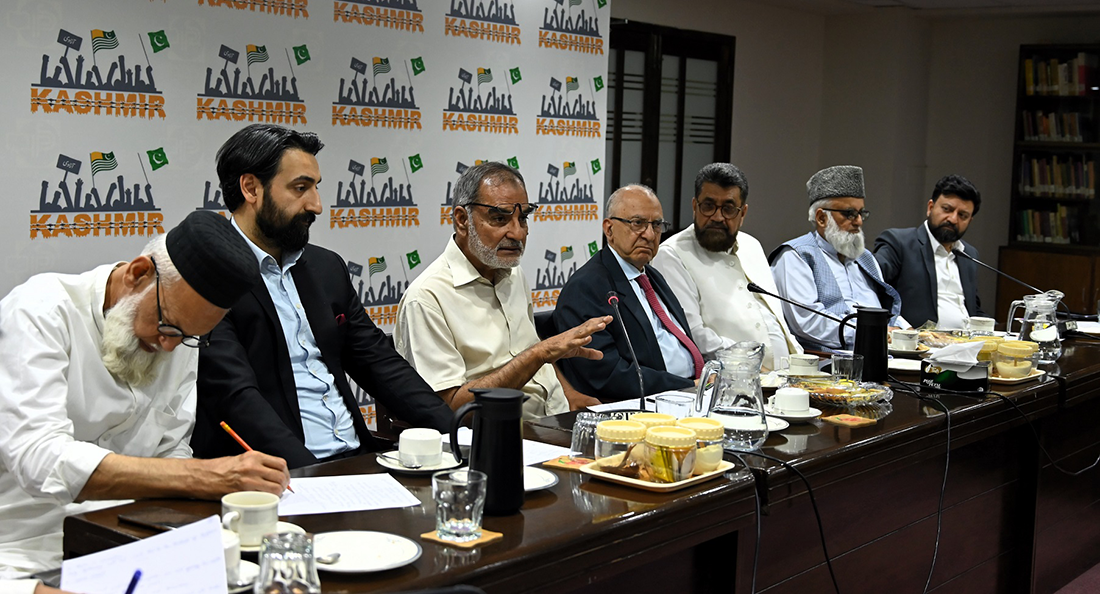
|
IPS TV |
| Importance of thinks tanks in building narratives on Kashmir-like issues | Chairman IPS | Kashmir needs strategic narrative, proactive diplomacy, amplified Pakistani support: Dr Fai |
| Effective narrative building needed to reinforce Kashmir’s freedom struggle | Muzzammil Ayyub Thakur | Human rights violations by India must be communicated to the world clearly | Zafar Qureshi |






